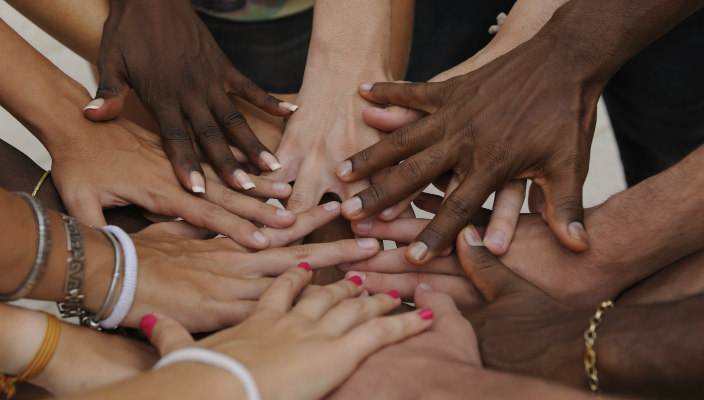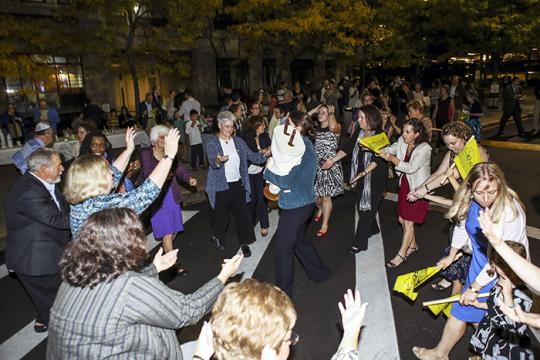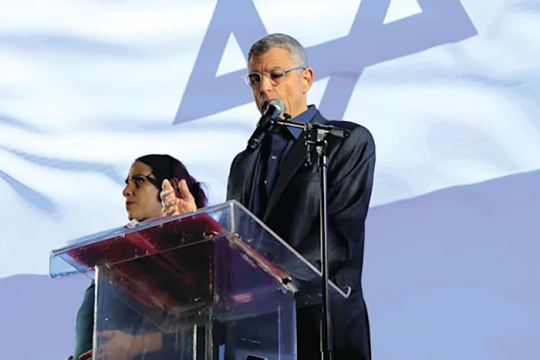
To warn fugitive slaves of danger on the Underground Railroad, Harriet Tubman would wander by their forested hideouts singing “Go Down Moses”:
Go down, Moses
Way down in Egypt’s land
Tell old Pharaoh
Let my people go!
This Negro spiritual – and the story of Israel’s deliverance from bondage – has sustained the black American struggle for freedom ever since, finding new life in the civil rights movement and more recently, in the Movement for Black Lives, which has reignited the spiritual’s vision for liberation in the hearts of many Americans.
During Black History Month this year, the song’s continued resonance reminds American Jews that in many ways, we are still in Egypt’s land, and the story of our liberation remains unfinished. God’s message to Pharaoh did not end with “Let my people go,” but continued, “so that they may serve me in the wilderness.”
Our freedom was always contingent upon living out God’s vision of freedom and dignity for all people. Through our ongoing work to transform the wilderness into the Promised Land, we remind ourselves that promoting racial justice is indeed a Jewish issue.
Black History Month is also an opportunity for us to celebrate the rich history of black Jews that goes back to Moses’s wife, Tzipporah. We don’t often learn that many of the matriarchs and patriarchs of the Torah were black and brown, and we rarely make note of the fact that more than 10 percent of American Jews identify as Jews of Color.
The leadership of Jews of Color will only deepen as the demographics of the United States diversify and as Jews continue to be a diaspora people with flourishing communities in the Middle East, Africa, and Latin America. Racial justice is a Jewish issue when we celebrate the beautiful diversity of our entire community – and commit to loving and protecting all among us. Furthermore, recent demographic studies, like the one recently conducted in San Francisco, tell us that Jewish multiracial households comprise 25% of the Jewish population in major metropolitan areas.
Recalling our long history of resistance and resilience, Jews have been advancing racial justice as a core Jewish value for a long time. Among the leaders were Henry Moskowitz, a founder of the NAACP, and the kippah-wearing Freedom Riders on the front lines of the civil rights movement, all of whom joined the struggles for equality for people of color in this country.
During this Black History Month, it’s also important to recognize that Jews have not always heeded the call of our tradition’s values. Indeed, Billy Simons, a Hebrew scholar and native of Madagascar, was among the first black Jews documented in the United States, brought here after he was purchased into slavery by white Jews in South Carolina. This history is painful, but recognizing it is the first step in redoubling our efforts to ensure racial justice today.
Even as the Jewish community’s proximity to whiteness historically has provided some measure of privilege and security, it has also had a corrupting influence on our values. At moments such as this – when anti-Semitism spikes – we see just how tenuous the security is that this alliance provides.
The status of the majority of North American Jews as white people goes only so far. In moments of crisis, we are consistently singled out and targeted. The way to move through the fear and shock that seize our community in the wake of these moments is to commit ourselves to advancing racial justice, because both anti-Semitism and racism are outgrowths of white supremacy.
Ultimately, it is solidarity across racial/ethnic, faith, and class lines that will keep us safe – and fortunately, our own community includes these multitudes. Racial justice is a Jewish issue because Jews come in all colors (aren’t we beautiful?), and as demographics in the United States change over time, more and more of us will fall into the category of Jews of Color.
This Black History Month, as we remind ourselves that racial justice is a Jewish issue, we must join with Jews of Color and people of color in our communities to advance racial justice. Doing so is one more way we can continue the work of tikkun olam (repair of the world), embody the virtue of audacious hospitality, and strengthen our entire community.
For information, resources, and best practices to help create a more inclusive environment for Jews of Color within your congregation, download the Audacious Hospitality Jews of Color Educational Resource Modules.
To get involved in racial justice work, visit the RAC’s website, learn to use the reflect, relate, reform framework, and join the Criminal Justice Reform group in The Tent.
Have something to say about this post? Join the conversation in The Tent, the social network for congregational leaders of the Reform Movement. You can also tweet us or tell us how you feel on Facebook.
Related Posts

URJ and Israel: Post-October 7th Updates and Resources

This Year, Will We Turn our Mourning into Dancing?

